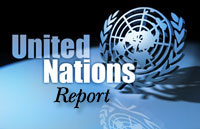
UNITED NATIONS (Finalcall.com) – Phyllis Bennis, senior fellow, Middle East/UN Affairs expert for the Washington-based Institute of Policy Studies, told the Inter Press service back in December that “2006 would be the crucial year” in determining whether the United Nations could “reclaim its role as an independent actor on the world scene, or whether the virulent United States choice of either sidelining or undermining the global organization would prevail.”
Ms. Bennis is the author of the book “Calling The Shots: How Washington Dominates Today’s UN.” When asked by The Final Call during a recent telephone interview, if the U.S. would be able to use the UN Security Council to get its way on sanctions against Iran, she said she feared that the present UN Security Council was not as strong as the one that would not give the U.S. and Britain permission to attack Iraq.
“The U.S. won’t find the type of opposition from the (15-member) Security Council this time that it faced in the run up to the war in Iraq,” Ms. Bennis said.
Ms. Bennis also said that, because of the UN’s culture of secrecy and non-answerability, there would not be any open discussion on what some say is the real reason for the U.S. pushing for sanctions; and that is Iran’s threat to sell oil only using the euro.
The U.S. says it wants Iran before the Security Council, accusing the Islamic Republic of secretly developing nuclear weapons.
Iran’s retort is its nuclear research is peaceful and that the U.S. charge is politically motivated.
“The U.S.’s true intentions for going after Tehran may have more to do with what’s hidden beneath Iran’s arid soil than their nuclear ambitions,” writes Joshua Frank, author of “Left Out! How Liberals Helped Reelect George W. Bush,” in a Jan. 24 story on Znet “War with Iran, It’s More Than Nuclear.”
In an email response to the question on how would the U.S. get Iran before the Security Council, Mr. Frank said: “The U.S. will most likely approach China and Russia before really trying to push the Iran nuclear issue to the Security Council. I am not sure if the U.S. wants to be embarrassed by China and Russia by pushing this thing too fast. They don’t want an Iraq, part two here.”
Mr. Frank repeated what he wrote in his Znet piece. “Underlying most of this isn’t really the nuclear issue. It is Russia and China’s economic interests in Iran that are at stake. And oil is at the top of the list,” Mr. Frank said.
“Currently, the second largest untapped oil reserve in the world is in Iran. Iran has five times more oil than the U.S.. Iran is also the number two producer in the Organization of Petroleum Exporting Countries (OPEC),” writes Mr. Frank in his Znet article.
He said China has its sights set on Yadavaran, one of Iran’s largest untapped oil fields. According to the article, Russia ships crude to Iran, where it is refined for domestic consumption; and in return, Iran delivers an equivalent amount of oil to Russia.
Iran has announced that there would be a reduction in oil production if it is sanctioned by the UN, according to tehrantimes.com.
Reuters reported on Jan. 27 that crude had jumped to $67 a barrel “as nagging supply disruption worries” centering on problems facing major producers Nigeria (separatist attacks on reservoirs) and Iran.”
A chief economist for the European Central Bank told reporters, on Jan. 23, that higher oil prices may spur acceleration in inflation; and that monetary policy was likely to become more euro-favorable, according to Bloomberg.com, which also reported that the European Central Bank reports that there has been a faster economic growth in the 12 nations that share the euro, than was anticipated.
All of this talk about the growth in the euro has the Bush administration up in arms as observers say the U.S. will never allow the Iranian government to open an oil exchange (bourse) that trades petroleum in euros. Analysts note that America monopolizes the oil trade, and Iran’s threat to open its exchange in March dealing only in euros would force the falling dollar to go nose-to-nose with a more stable currency such as the euro. (The dollar now accounts for 68 percent of global currency reserves, up from 51 percent just a decade ago.)
The U.S. has already begun its program of arm-twisting, as is evident in the statement that, if India did not vote for referral of Iran to the Security Council during the Feb. 3-4 meeting of the International Atomic Energy Agency (IAEA) in Vienna, the U.S. would pull out of a deal with India concerning nuclear energy cooperation.
India has also announced that it may opt out of the Iran oil pipeline project worth $7 billion, fearing hostile reaction from the U.S. But, Pakistani President Pervez Musharraf, in a Jan. 26 interview with Agence France Presse, stated that his nation was standing firm on building the pipeline with Iran amid pressure from the United States.
The Bush administration has publicly opposed the project, arguing that Tehran needed to be isolated until it was willing to give up its nuclear program.












